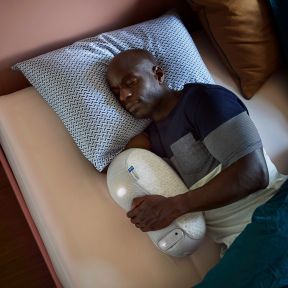Sleep and Mental Health
The relationship between sleep and mental health—both positive and negative—is multifaceted and complex. But in general, evidence consistently shows that healthy amounts of sleep are associated with better mood, improved productivity, and even heightened satisfaction with life in general.
The relationship between sleep and mental health disorders, on the other hand, is somewhat murkier; many psychological disorders present with sleep-related symptoms, but experts aren’t always sure whether poor sleep leads to depression, ADHD, or anxiety, or vice versa. But for most patients with mental health concerns, addressing any related sleep problems is often a good place to start; it may not be a cure-all, but it will likely bring physical and mental benefits that put the person on the path to better well-being.

Though scientists are still investigating all that happens in our brains and bodies during sleep, what has been discovered is clear: When it comes to mental well-being, sleep matters tremendously. During sleep, the body and brain repair themselves, strengthening the immune system—which has close ties to mental health—bolstering the stress response, and recharging the systems that help regulate emotions, consolidate memories and thoughts, focus, and connect to others. High-quality sleep, in short, can improve someone's life in a number of ways.
A substantial body of evidence suggests that sleep and happiness are closely linked, and that their relationship is likely bi-directional. One large analysis, for instance, found that people who reported greater positive affect in their daily life were more likely to sleep better overall; the improved sleep, in turn, appeared to bolster their positive mood. Research in children has shown that sleep deprivation is linked to more negative moods and challenges with emotional regulation; on the other hand, children and teens who get adequate amounts of sleep report feeling happier.
Research has found that better quality sleep, longer sleep duration, and greater consistency in the amount of time spent asleep each night all appear to be associated with greater satisfaction with one’s life, a commonly used measure of overall well-being. Though it remains to be definitively established whether increased life satisfaction is caused by improved sleep or vice versa, the overall evidence suggests that focusing on sleep may be one potential pathway to improving contentment with one's lot in life.
It’s hard to think straight when sleep deprived. Sleep deprivation has been shown to disrupt focus in a number of ways, from interfering with the production of neurotransmitters to making it harder for brain cells to communicate with one another. On the other hand, getting an adequate amount of restful sleep has been linked not only to better brain health and improved focus, but also to heightened creativity and improved memory. A good night’s sleep, in short, can boost cognitive function in a variety of ways—making it especially critical for students or for adults whose jobs demand the use of mental resources.
During sleep, the brain and body are recharging and repairing themselves on a cellular level. Sleep also regulates the body's hormone levels and strengthens the immune system. All of these functions, as well as other physical and mental benefits of quality sleep, combine to improve energy levels throughout an individual's daily life.
In general, yes—sleep boosts focus, creativity, and energy, all of which can improve someone's productivity at work, school, or elsewhere. Conversely, a lack of sleep has been found to have negative effects on individuals, organizations, and the larger economy. One recent study found that sleep deprivation costs the American economy more than $400 billion dollars a year in lost productivity; by contrast, if people who slept six hours a night started sleeping seven instead, it would add more than $200 billion back.

Disordered sleep often goes hand in hand with a lower mood, heightened anxiety, or increased stress. But though almost everyone has plenty of personal experience with a spike in stress or an emotional outburst triggered by a night of poor sleep—and countless others experience depression-, ADHD-, or anxiety-related sleep challenges that can persist for months or years at a time—they may not make the connection directly, and may still fail to prioritize sleep as a result. Unfortunately, sleep problems and poor mental health tend to reinforce each other, creating a cycle of distress that may require professional help to overcome. Catching the problem early, and taking deliberate steps to combat it, is often the best approach for breaking the cycle.
Yes. Because inadequate sleep interferes with the connection between the amygdala (which processes emotions) and the prefrontal cortex (which manages impulse control and decision-making), sleep deprivation has been closely linked to heightened emotional reactivity. For many, this means that after a night (or several) of poor sleep, they’re crankier, quicker to anger, more sensitive to perceived slights, and may respond more impulsively to daily annoyances that they would normally take in stride.
Depression and disordered sleep—either sleeping too little or sleeping too much—frequently go hand in hand. In fact, some experts have suggested that sleep problems like insomnia should be considered as a core symptom of depression. But whether sleep problems lead to depression or vice versa has yet to be fully teased out. Most experts agree that addressing both, rather than focusing on one or the other, is the most effective path to optimal treatment.
Chronic fatigue or sleeping excessively can be indicative of depression in some cases. If symptoms of perpetual tiredness are primarily physical, it’s more likely to be related to another illness; if it also comes with persistent feelings of sadness, hopelessness, guilt, or apathy, it may be linked to depression. Either way, excessive fatigue should be reported to a primary care doctor, who can assess the individual and make further recommendations for care.
It can be immensely frustrating for someone to get into bed, ready for sleep—only to have worries, stressors, or unfinished to-do list items buzz around their brain and keep them up for hours to come. Writing anxieties down in a journal can be an effective way to calm a restless mind and soothe nighttime stress; for many, putting anxious thoughts onto paper dampens their power and helps the individual “empty” their head. Guided meditations can also help; focusing on the breath—rather than an important deadline tomorrow—can temper distraction and nudge anyone toward relaxation.
Poor sleep is theorized to trigger the production of stress hormones like cortisol, which can increase anxiety the following day. It’s also been linked to increased activity in the parts of the brain that generate emotions and decreased activity in the parts of the brain that regulate those emotions. In most cases, these hormone and brain-activity imbalances are temporary. However, it’s all too easy for anxiety and sleep deprivation to feed off each other and create a never-ending cycle. If anxiety persists or interferes with someone's day-to-day life, and they're unable to sleep better on their own, it may be beneficial to seek professional help.
One of the main functions of sleep is to allow our brains to sort, categorize, and file away our most important memories. Thus, in even the healthiest people, a night of sleep deprivation can impede their next-day cognitive performance, including their memory.
Poor sleep is closely tied to Alzheimer’s and other forms of dementia, which may be related to the malfunctions in memory storage seen in both. Up to 60 percent of people with Alzheimer’s also suffer from at least one serious sleep disorder, research has found. Newer findings suggest that the amyloid buildup seen in the brains of Alzheimer’s patients may be related to poor quality sleep, leading some experts to wonder whether Alzheimer’s directly impacts memory, or if it impacts memory by first harming patients’ sleep.
Attentional capacity is especially sensitive to the effects of sleep deprivation. After a night of poor sleep, people report significantly greater difficulty focusing on tasks or following through on projects; they may feel like they “can’t think straight” or organize their thoughts coherently. They also experience slower reaction time, which makes it difficult to shift their attention between competing priorities or information. When sleep deprivation continues beyond a single night, it can have severe consequences on someone’s work output, educational success, or even their relationships.
ADHD and difficulty sleeping appear to have a bidirectional relationship that researchers are still trying to fully understand. Sleep problems are significantly more common in those with ADHD than they are in the general population. But while they’ve long been treated as separate but co-occurring disorders, more recent theories suggest that in some cases, both may originate from the same circadian rhythm dysfunction and delays in the release of sleep-related hormones. More research needs to be done to fully understand the connection—but until then, most experts recommend targeting sleep problems directly in order to improve ADHD symptoms and overall well-being.














